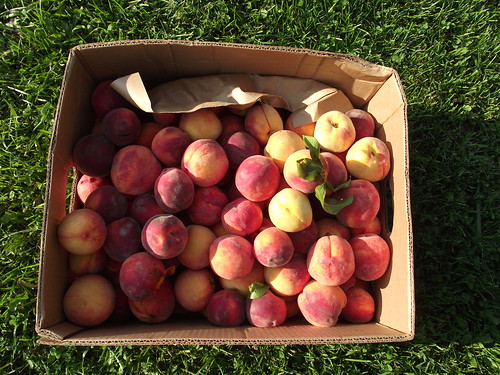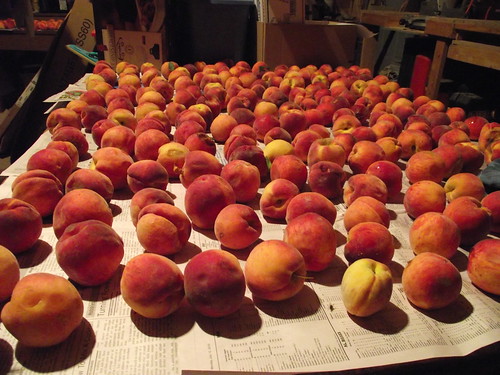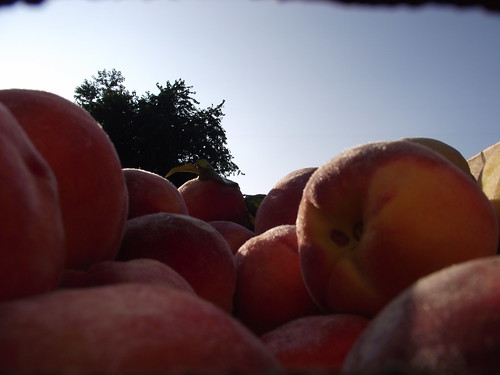I decided to work on “part 2″ this week and do the second R of Relationships next week–I’ve had a crazy busy week and today picked up 3 bushels of peaches that need done right NOW!

I said this would be a much shorter post–well, maybe!
Grammar…..read Ruth Beechik! ![]()

- Did someone say, “Grammar”?! I’m outta here!
Ruth Beechik says over and over (and over and over) that you don’t learn grammar to write, you write to learn grammar. I wholeheartedly agree. And quite frankly, life is too short to work on grammar books every single year of a child’s life. I know some of you may raise an eyebrow at that, but as one who has graduated three from homeschool now, and all three can write fairly well, I feel I have a little experience to make that statement!
I think learning grammar in context is the best way. A really good resource I’ve used for that is Learning Grammar through Writing. It seems to be out of print right now, but available used. I used it more as a resource for me to teach on the spot. Really, a good handbook would do the same. Something you could look up and point out why a comma goes here (or doesn’t), whether to use lie or lay, and whether to say their/there/they’re.
Believe it or not, that is primarily the way I have taught my older daughters–and after awhile they learn to use those handbooks themselves! ![]()
Hear Ruth Beechik’s tongue-in-cheek but oh-so-true wisdom on grammar:
Did God’s voice thunder from Mount Grammaticus, “These nouns and these verbs which I give unto you shall you use with all the inflections thereof which I declare unto you; and you shall teach them unto your children and your children’s children unto all generations”?
No one I know believes that such an event occurred, but many people treat grammar as though it occurred. For over two centuries our schooling has conditioned whole generations to view grammar as an authoritarian system. Our textbooks contained all the pronouncements about “right” and “wrong.” Maybe we, personally, didn’t understand some of them, but that was our fault, we thought. It was clear–to somebody.
Here is an interesting tidbit that also might shed some light on the “study of grammar”:
Grammar teaching….was closely intertwined with study of the classic poets, and not a means for learning language. In primary school, Greek children had already learned to write fluently, and then in grammar school they studied the classic writers, and learned grammar in that context.
You would not want to imitate Greek teaching methods, since they were limited. For instance, because they had no printed books, a great deal of time was spent comparing the students’ written copies with the teacher’s in a critical examination of the text. As time went on, the Greeks lost all sense of why they were teaching the classics. Emphasis was on words and details rather than on meaning. Knowing details of the classics became an end in itself, and lost was the vision of heroism, morals, thinking and other higher purposes in literature.
Some would argue that we are suffering the same loss of vision about why we teach grammar. As a scholarly discipline, it is one of the highest uses of the human mind. But as an authoritarian system, it fails us. It doesn’t help our children write, as we hoped it would.
~You CAN Teach Your Child Successfully, pp. 165-166
True confessions–I have some that don’t know all the “technical” terms of grammar–but they can write. As usual, if I’m going to err, I want it to be on this side of that debate! ![]()
The Language Lessons books by Sandi Queen I mentioned last week do have some gentle grammar. If you’re not using them, I suggest finding a good handbook you like (Rod and Staff, Writers Inc., or the aforementioned Learning Grammar through Writing). I personally do NOT feel you need a separate grammar “program” to work through. If it is not going to necessarily help your child write better, and it’s taking time away from real writing–why bother?!
There are a few “Charlotte Mason” type gentle grammar studies out there that I could use, if I were inclined to do something more “official” with grammar. Karen Andreola’s Simply Grammar is sweet and pretty low-key. I know it’s written for “elementary age”, and it’s mostly oral, but do you really need a scholarly study of grammar for every child? If you really, really feel they need “more”, please wait until they are older (I would say 15 or older and writing well) and maybe do Easy Grammar. But please do NOT buy all the graded workbooks, just the main book and please do NOT make your child do each and every problem on each and every page. They can go over it, do a few exercises, and if they get it, go on. The goal is NOT to fill that workbook up but for them to learn it so they can implement it in their writing!

You're not *really* going to make me study grammar, are you?
Now on to spelling!
With my oldest two, I did the traditional spelling methods. Leah used to be able to pass her tests with flying colors….then not be able to spell “with” or “white” in her writing!
I became very frustrated with the “traditional method”, and I was blessed to get a good deal on Spelling Power many years ago. I really liked it for the oldest two daughters. The next two seemed to get bogged down in it. We tried Alphaphonics for awhile, and it was helpful, but still didn’t help as much as I had hoped.
For Susannah, we found Apples. Apples 2 was okay, but she liked the first one better. Then we used (ahem…very minimally!) Spelling Wisdom from Simply Charlotte Mason. It is basically copywork, and when they are ready, you dictate the sentence or passage to them. She liked it fairly well, and I don’t know why we let it drop. She’s “graduating” now, but if she wants to pick it back up, we might! ![]()
Cassia started using Andrew Pudewa’s Phonetic Zoo. I did not buy all the cds–I thought we could make our own tapes! A bit of work, but doable! She really liked it, but life got in the way and we didn’t keep up with making the tapes (which is probably why maybe you should buy the cds…). I looked at AVKO’s Sequential Spelling, and it looks good, but Cassia decided to try Natural Speller by Kathryn Stout.
Now this is not a pull-it-out-no-planning item! But neither will it take you forever to figure out! We just got started on this last spring before my mom passed away, so it’s on hold until this fall. I basically have used a lot of what I’ve learned from other spelling programs and Ruth Beechik about testing the words they miss vs. studying a list and then testing. So I was going through the lists from grade 1 (sometimes the simplest words trip you up!). There is a little grammar instruction in there, too.

If you are brave enough to not have a “curriculum”, per se, you can use Ruth Beechik’s ideas in You CAN Teach Your Child Successfully. She has Common Word Spelling Lists for grades 4-8 in there (even though Kathryn Stout’s has grades 1-4 in hers, I again don’t think children need formal spelling instruction until 4th grade or older…usually older!). You could test them until they miss some, let them study those, help with any “rules” that might apply (but don’t get caught up in that too much!), and then retest with another list the next time.
I have actually done this with Diane Lopez’ book “Teaching Children“. She is a Charlotte Mason advocate, and her book is subtitled “A Curriculum Guide to What Children Need to Know at Each Level Through Sixth Grade” (what a mouthful!). She has a Spelling section as well as a Dolch Sight Word List in the Reading section for each “grade”. Again, I don’t advocate worrying too much about spelling too soon. But going through these lists/ideas as well as using words from their writing (Ruth Beechik advocates writing every day!), will really give you more of a well-rounded spelling program than you realize!
Also, please don’t do 20-30 words at a time! 5-10 are really enough. If you are just “testing” to see where they start missing grade level wise, you could maybe add more in just for that purpose, but please don’t give them 20 words each week (or whatever time frame) to study!
Barb Shelton (another favorite!) in her Jumpstart Navigator said that for years her children had only 5 spelling words each week. Her daughter went on to do well in college, and I believe her son is a well-adjusted adult as well!
Diane Lopez’ book doesn’t have word lists for spelling, but has listings like:
1. Phonetic and structural analysis principles
Example: silent letter(s) “ight”–bright fight light might
night right sight tight
2. Content areas
Words from the content areas should be used to supplement
the regular word list. (This is taking words from their
writing and reading.)
3. Sight words
Use words from the Dolch list and the basal reader.
4. Calendar-related words
Review the days of the week, months of the year, and
seasonal words.
Ideas taken from Second Grade Spelling section
I didn’t list all the ideas, but that gives you a picture of what it’s like. And again–this is very doable and low-key! I like low-key! ![]()

The bottom line for me is to not stress about “doing it right” or “covering it thoroughly” but working through it gently, in context with real life writing and reading.
In all honesty, isn’t that what you do when you need to check up on your grammar? Or spelling? Do you go do a “course” on it or just look up what you need?
There may be reasons where a formal study of grammar would be helpful, but I honestly haven’t used diagramming sentences since I had to do it in high school. It didn’t make me a better writer, either.
I share all this to help you relax–you will find what works for you and for your child(ren).
And of course, above all, keep the 3Rs of Relationships top priority! If it’s causing tears (in your child and/or you!) or making you have knots in your stomach, it’s time to change!

If you want some help planning your schedule, head on over to Belinda Letchford’s blog (I love her website, too!). She has three posts on planning that are very good and realistic.
Planning Part I: Getting My Head Around Planning
Planning Part II: Writing a Study Schedule
Part III: Prep Time
And here’s a wonderful story from another post, You Are Mine, Twice Over!
I hope you find her posts helpful during this “planning season”.
As for me, it’s “canning season”! ![]()

Tags: Fabulous Family Friday, grammar, Real Life Learning, relationships, Ruth Beechik, spelling, writing
Good thoughts… I don’t recall doing grammar at all past like 1st grade. I would ask my dad what a new word meant and he would give me a definition, breakdown of syllables, and a history lesson on the word. It was much more fun that way. My mom dropped my spelling too, soon after I became a voracious reader around age 12. By the time I was 14 I had gone from worst speller ever to grades ahead and so she let it go. I never had formal biology or chemistry either. What I know about those are thanks to lessons in the kitchen and around the farm – mostly from my dad. I loved going to him with questions about why or how because he would always drop whatever important thing he was doing to give me a thorough explanation and let me ask as many questions as I wanted to. He’d draw pictures or ope up reference books to show me illustrations or get out some ingredients and do an experement. And you know I think that is the best way to learn because I have not easily forgotten anything my dad taught me, but the things I read in textbooks are long gone and I have to look them up all over again when I need to know now as an adult.
My mom dropped my spelling too, soon after I became a voracious reader around age 12. By the time I was 14 I had gone from worst speller ever to grades ahead and so she let it go. I never had formal biology or chemistry either. What I know about those are thanks to lessons in the kitchen and around the farm – mostly from my dad. I loved going to him with questions about why or how because he would always drop whatever important thing he was doing to give me a thorough explanation and let me ask as many questions as I wanted to. He’d draw pictures or ope up reference books to show me illustrations or get out some ingredients and do an experement. And you know I think that is the best way to learn because I have not easily forgotten anything my dad taught me, but the things I read in textbooks are long gone and I have to look them up all over again when I need to know now as an adult.
We have so many Peaches we do not know what to do with them all!
We had about 9 box’s of them.
We are giving them away to the church.
Anna Kiser